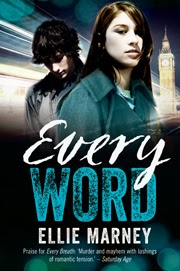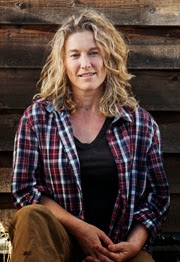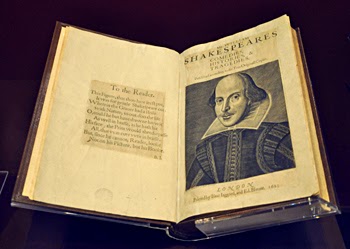 |
| Book 2 in the ‘Every’ Series |
Today, Cereal Readers talks with YA author, Ellie Marney, about grunge characters, writing romantic scenes, and scouting murder locations for her latest book in the YA crime thriller series, Every.
Firstly, let me say how much I enjoyed Every Word. (No pun intended!) The underlying story definitely gained momentum and developed in complexity, as did the key characters. Apart from the cryptic murder mystery to solve in the UK, Rachel and Mycroft and their evolving relationship became even more intriguing! It’s sparked many questions for me, so I’d better get started…
[CR] While the novel gives us Rachel’s point-of-view, with Every Word you’ve drawn the reader more deeply into Mycroft’s angst and the evolving relationship between the two teenagers. What were the challenges in exploring Mycroft’s psyche without writing from his perspective?
[Ellie] Ha, I was only thinking about this yesterday! Because I was writing Rachel’s point of view, there were times when I felt a bit disconnected from Mycroft’s psyche, and I really had to think long and hard about how he would feel, what he would say or do – that’s what happens, I suppose, when you become so firmly embedded in the head of one character.
To stay connected to Mycroft, I spent a while thinking about where he’s come from, and why he feels the way he does – what is this deep-seated sense of self-loathing grounded in? I even wrote out a few scenes using his POV, so I could really get a handle on it, particularly scenes where he’s very self-critical – it helped me to clarify that he’s still grieving so much for his parents, it’s something he’s never allowed himself to express properly so it’s like a wound that’s festered. Writing out of James’s POV really helped – sometimes you have to do that, remove yourself from the head of one character and get into another character’s head, to develop a better understanding.
[CR] Mycroft’ is an unusual character, isn’t he? He’s incredibly intense and somewhat unstable; something of an anti-hero, in many respects. What prompted you to create his character in the way you did?
[Ellie] I just think that people who are really driven and intense are fascinating characters – they’re great to read about! They’re wonderful to write too – that level of unpredictability is wonderful, it means your story can take unexpected twists and turns that are all character-driven. In some ways, those characters really write themselves – that’s certainly how I felt about Mycroft, that once I had the idea for him, he started to spring out fully formed!
But intense people like Mycroft tend to get that way for a reason, and it’s usually something traumatic that brings that out. Mycroft’s had some pretty horrific experiences in his life, and his current living arrangement is far from ideal, for him or his aunt (although they are starting to soften towards one another in Every Word, and things evolve further in Every Move). Mycroft has a lot of potential, as an investigator and as a person, but he’s got a lot of baggage to get past. I think teenage (and adult) readers identify with that desire to mature and conquer your own personal demons, so you can live up to your own potential.
 |
| Ellie Marney [Photo: Justine Bernhaut] |
[CR] Every is a crime mystery series with an emphasis on forensics, what motivated you to write in this genre for young adults? How did the forensic focus come about? Is it a particular interest of yours?
[Ellie] I confess that I actually love forensic procedurals! There’s something about the focus on the details of the puzzle that I really enjoy, and the forensic examination of physical remains is something that I find fascinating – it’s like Rachel said, it’s gory, but there’s something so universally human in it, that final understanding of the body in death. And the idea that a person’s body can hold the clues to their own death, even after they’ve lost the ability to tell us what happened to them, is really quite amazing and mysterious.
I suppose I felt that the forensic procedural was something that had never been done for an Australian YA audience before (to my knowledge: although US-writer Barry Lyga uses it in his crime/horror novels to great effect). And I’d spent some time in high school libraries, and seen books by Patricia Cornwell and other ‘forensic focused’ mysteries for adults on high school shelves, so I knew that secondary students had some interest.
I think teenagers are actually as interested in the processes of death and post-mortem as everybody else. It’s a bit of a taboo subject, and teenagers enjoy nothing better than breaking taboos!
[CR] The theme of fire runs throughout the novel—whether it’s an external fire, such as the bushfire threats Rachel remembers from her farm days, or the internal burn of passion or the burning desire for resolution. How important was the fire imagery to how you unfolded this part of Rachel and Mycroft’s story?
[Ellie] Ah, my editor actually had to rein me in with the fire motif! – she was like ‘Okay, Ellie, I think we’ve got enough fire-related metaphors now’! I had to tone it down. 🙂
It was something I realised was coming through when I was halfway done with the writing – some themes only clonk you over the head when you re-read. I thought it was pretty appropriate for the reasons you suggested, it was a good linking image for the building romance, and Mycroft’s fiery temperament. Also this book is really about Rachel growing up: that burn of energy and excitement that starts rising inside when you start emerging into adult life, and realising you can make your own decisions. And I thought it made a great contrast with the cold weather of England!
Interestingly, when I went to the Bodleian Library to do research, I discovered that they make you swear an oath – an honest-to-goodness, old-fashioned oath – before giving you permission to enter, in which you swear ‘not to kindle, or allow to be kindled, any fire or flame within the confines of the library’… Very sympatico!
[CR] As characters, Rachel and Mycroft are not ‘glossy’; you’ve given them a very real/grounded presence with not only scruffy hair and extremely limited wardrobes, but with an almost grunge appearance and nicks from shaving, etc. Did you have any concerns with how their images would be received, given many young adult novels present their characters as physically quite polished?
[Ellie] Oh no, I definitely wanted them a bit grungy! It actually drives me mad, the way teenagers are sometimes portrayed as being so put-together, especially female characters. Teenagers are messy! That is their natural state! And Rachel and James have way too much going on in their lives for them to fuss over things like their hair or clothes. I just couldn’t imagine them preening, it would seem out of character – Rachel is too pragmatic, and James is too mentally preoccupied.
I didn’t think of how that would go down with readers at all, but they seem to enjoy it. Maybe they appreciate a touch of reality!
[CR] In Every Word, Rachel has joined a roller derby team! Why did you choose that particular sport for her?
[Ellie] I’m a huge fan of full contact sport for women. I trained martial arts (tae kwon do, kickboxing, karate, you name it), as a teenager and adult, so I’m quite into it – going to grungy gyms, and getting sweaty and sore. There should be more pathways into hard sports for girls, I think, because many of them don’t have a go, or have a try and then give it away – it used to be considered ‘unlady-like’, and it’s interesting how that limitation still exists in some contact sports. Consequently, women have reserves of endurance and physical strength that they rarely take advantage of.
Roller derby is hard, rough, and absolutely thrilling to watch! A friend, Meg Philips, talked me through a big derby bout and worded me up on the lingo – like ‘boutfits’, for the wild gear that the competitors wear – it was fantastic! Rachel’s mate, Mai Ng, is the derby girl in Every Breath, and it seemed natural that Rachel would gravitate towards a sport that made use of her natural toughness.
[Ellie] No, I didn’t – I think that’s actually very hard to receive permission to do. It’s certainly something I’ve found impossible to do in Australia, and I can fully understand why that’s so. What I did do in London was to interview an Anatomical and Pathology Technician, and she was incredibly helpful. I was also given a full tour of the mortuary premises, including the Forensic Suite. I should have taken photos, but I was very aware of how sensitive some of these details are, and how scrupulous staff have to be – considering the feelings of relatives of the deceased, and being aware of current judicial cases, and so on. So I just looked very long and hard, and made page after page of scribbled notes. I tried to be as faithful to my original descriptions as possible, from the look of the place to the smells and sounds. It’s a very calm environment, but still quite disturbing on some levels.
I also read and re-read Helen Garner’s account of witnessing an autopsy in her famous article ‘At the Morgue’ – her impressions in that article, combined with my own experience of walking through the mortuary plus some online research, formed the basis for Rachel’s description of the post-mortem in Every Word. I have no idea how Helen Garner managed to get permission to view an autopsy – I met her recently, after a speaking event, and she said she actually got a dressing-down from the Coroner when he realised she’d been allowed in!
 |
| Shakespeare’s First Folio |
[CR] I am quite envious that you were able to handle Shakespeare’s First Folio! How did you decide that the item stolen in the novel would be the First Folio?
[Ellie] Oh, that was incredible! I was given an amazing opportunity to interview the Head of Rare Books, as well as a library conservator, at the Bodleian Library in Oxford. And when I asked to see some of the books published at around the time of the First Folio – which is absolutely impossible to view, unless you’re a president, or a prime minister, or something like that, it’s just so valuable and precious – the Head of Rare Books explained that actually, the Korean ambassador had been in to view the Folio only the day before, and the Folio was still in the office, and would I like a look? I spluttered a lot before I said yes!
Viewing and handling the First Folio is something only a few dozen people in the world ever have the opportunity to do, so I felt enormously privileged. Seriously, Shakespeare is like the writer’s god, so I felt like someone had handed me the Holy Grail or something. I was in a daze for ages afterwards!
Why did I use the Folio as the catalyst for the mystery? Well, that’s a good question – actually I think I was being a bit self-serving there! I wanted to send the characters back to England, to explore Mycroft’s past. For me, England is the home of Shakespeare, and the Folio is one of the most crucial cultural artefacts of not only the UK, but all of Western literature. When you set the stakes in a theft caper, you’ve got to set them high! (It was either that or the Crown Jewels!)
[CR] Do you find it easier to write during the day or at night? What sort of routine do you have and what methods do you use if the words aren’t flowing as you’d like?
[Ellie] I write first thing in the morning – very early in the morning, when I’m on a roll. I used to get up at about 4.45am and start work at 5, to get in as much as I could before school preparations and general life began. I have a more sane routine now, getting up about an hour before school prep, and working on after everyone has left!
When the words aren’t flowing I am a bit of a bull terrier – I will sit and stare at it, and keep pounding away at the keyboard. Bum glue is what Stephen King calls it, where you just sit and keep banging away until you’ve got something you can craft properly later. If I’m really stuck, I will go for a walk, or do dishes or something – some repetitive, boring task that lets you think – until I figure out what’s going on. Often if I’ve reached an impasse it means I’ve forced the characters to do something that isn’t natural for them. Then I have to go back and find the point where it was flowing, and allow the characters to make a more natural choice.
[CR] Every Word is a novel I think would lend itself very well to a film adaptation. Is that something you can also envisage?
[Ellie] I try not to think about that! Of course it would be lovely, but it’s something completely outside my control – so many good ideas never find their way onto screens, film and television production is such a complex process. I worked with VCA film students for a year when I first came to Melbourne, doing crew work, and making a film is an incredibly complicated thing, even as a student. How films ever get made, when you see what goes on behind the scenes, is really quite miraculous, in my opinion.
So I will happily let the characters live and adventure in my head, and if they ever make it onto a screen then I will be both delighted and amazed!
[CR] Of course, I have to ask you, what series did you enjoy when you were growing up?
Every Word is published by Allen & Unwin and currently available in bookstores and online. You can also view information on the Every series, including a review on Ellie Marney’s first novel, Every Breath, on the Cereal Readers’ website: www.cerealreaders.com.
– Marielle Rebbechi
